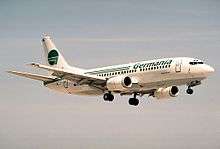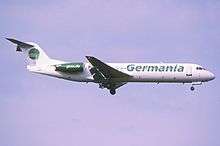Germania (airline)
 | |||||||
| |||||||
| Founded | 1978 | ||||||
|---|---|---|---|---|---|---|---|
| Operating bases | |||||||
| Subsidiaries | |||||||
| Fleet size | 36 | ||||||
| Destinations | 42 | ||||||
| Headquarters | Berlin, Germany | ||||||
| Key people | Karsten Balke, CEO | ||||||
| Website | flygermania.com | ||||||
Germania Fluggesellschaft mbH, trading as Germania, is a privately owned German airline with its headquarters in Berlin.[2] Originally focused on charter operations, in recent years Germania has moved towards becoming a scheduled carrier, although some charter flights are still flown under the brand.[3] The change in strategy has led to growth over the past few years, and Germania now operates to destinations in Europe, North Africa and the Middle East from several German bases. It carried 2.5 million passengers in 2009 and had around 850 employees as of summer 2014.[4]
History
Early years 1978-1999

The airline was founded in April 1978 as Special Air Transport or SAT for short in Cologne and started operations on 5 September 1978 with a Fokker F-27. In November 1978, a Sud Aviation Caravelle was purchased from LTU, which was replaced by two used Boeing 727-100 from Hapag-Lloyd Flug (now TUIfly). Germania Express has adopted the IATA code "ST" which was previously used by Yanda Airlines.
In spring 1986, the company was re-organised and its name was changed to Germania on 1 June 1986.[5] For many years, Germania's main area of doing business were charter services for TUI, Condor and Neckermann Reisen – an area in which Germania earned a reputation for offering the lowest prices. In 1992 the registered office was relocated to Tegel. In the same year Germania won the bid for flight services between the old and new capital of Germany (Bonn and Berlin) on behalf of the German government, establishing a short-lived Beamten-Shuttle (German for “shuttle for civil servants”).
In 1998, the airline pioneered the use of aircraft for advertising in Germany (advertisers included Siemens and various tour operators). In the same year, Germania began to lease more and more planes to other airlines such as Hapag-Lloyd Express, Maersk and Delta.
Moves towards direct sales in 2000s

In June 2003, Germania started to offer tickets directly to passengers under the brand Germania Express (often shortened to gexx). Following a purchase of a 64% stake in dba (later part of Air Berlin) on 28 March 2005, Germania wet-leased 12 Fokker 100 aircraft to dba. At the same time, dba took over Germania Express's 15 established low-cost routes and thus absorbed Germania's gexx brand. Germania on the other hand, with all aircraft having been leased to other airlines, no longer offered routes directly to passengers. While the partial merger between Germania and dba was already reversed in the summer of 2005, the cooperation of Germania and dba was extended to 14 Fokker 100 aircraft. Air Berlin chief, Joachim Hunold, was tasked by Germania owner, Hinrich Bischoff, to take charge of the future of the company shortly before Bischoff's death on 11 November 2005. However, no agreement between Bischoff and Hunold was implemented in the end because Bischoff's heirs refused to accept it.
Germania relaunched scheduled flights under its own brand name out of Berlin and Düsseldorf, beginning with the 2008 summer schedule.
The foundations were laid for the first maintenance hangar at Berlin Brandenburg Airport on 21 March 2011. Germania plans to use the hangar together once the airport becomes operational.[6]
On 3 March 2014, Germania had its traffic rights for flights to Iraq revoked after an intervention by Iraqi Airways.[7] On 12 March 2014, Germania was allowed to resume all operations to Iraq with the first flight resuming on the 17 March 2014.
Further expansion and fleet plans
In spring 2015, Germania announced plans to phase out all of their recently refurbished Boeing 737-700s by 2020 to become an all-Airbus operator.[8] 25 new A320neo aircraft will be added to the fleet from January 2020.[9]
In September 2016, Germania announced it would cease all operations at Kassel Airport where it was the only scheduled carrier.[10]
In August 2017, the airline obtained an air operator's certificate (AOC) for its Bulgarian subsidiary, Bulgarian Eagle,[11] and it has registered an Airbus A319 in Bulgaria. The aircraft will, according to the airline, be wet-leased to partner companies.[12]
Corporate affairs

Ownership and structure
Germania Fluggesellschaft mbH is a private company that had been founded and run for many years by Hinrich Bischoff, who died on 11 November 2005. His wife Ingrid Bischoff was the main shareholder, but she sold it. Germania has its headquarters at Riedemannweg 58, Berlin, Germany.[13][14]
There are currently three main operating subsidiaries:
- Germania Flug, founded in 2014 in Switzerland to operate leisure flights under the newly established HolidayJet brand in cooperation with Swiss tour operator Hotelplan[15] (three aircraft).
- Bulgarian Eagle, founded in 2016 in Bulgaria as an ACMI carrier, with aircraft based at London Gatwick (two aircraft).
- Germania Technik Brandenburg GmbH, the wholly owned aircraft maintenance subsidiary, based at Berlin Schönefeld.
Germania also had an interest in:
- Gambia Bird, a airline based at Banjul, The Gambia,[16] which ceased operations on 30 December 2014[17]
Business trends
As Germania is a private company, annual reports do not have to be published. Very few figures are released into the public domain. In the absence of these, the little information for the Germania group that appears to be available is:
| 2009 | 2010 | 2011 | 2012 | 2013 | 2014 | 2015 | 2016 | 2017 | |
|---|---|---|---|---|---|---|---|---|---|
| Turnover (€m) | |||||||||
| Profit (€m) | |||||||||
| Number of employees | 600 | 600 | 600 | ||||||
| Number of passengers (m) | 2.5 | 2.2 | |||||||
| Number of scheduled seats (only) (m) * | 0.22 | 0.75 | 1.31 | 2.83 | 3.19 | 3.95 | |||
| Passenger load factor (%) | |||||||||
| Number of aircraft (group)(at year end) | 15 | 17 | 15 | 29 | |||||
| Notes/sources | [18][19] | [20][21] | [22] [3] |
[3] | [3] | [3] | [3] | [3] [23] |
*In the absence of meaningful published data, the number of scheduled seats operated is shown as a proxy for the trends of the business.
Destinations
Germania offers a wide range of some year-round and mainly seasonal leisure and some metropolitan routes from several German airports. From its bases, scheduled flights to Armenia, Turkey, Kosovo[lower-alpha 1], Israel and Lebanon are also offered, servicing minorities living in Germany and Austria.
Codeshare agreements
Fleet
Current fleet
.jpg)
As of August 2017, the Germania fleet (excluding the Swiss and Bulgarian subsidiaries Germania Flug and Bulgarian Eagle) consists of the following aircraft:[25]
| Aircraft | In Service |
Orders | Passengers[26] | Notes | |
|---|---|---|---|---|---|
| Airbus A319-100 | 15 | 1 | 144 | ||
| 150 | |||||
| Airbus A320neo | — | 25 | 180 | to be delivered from 2020[27] | |
| Airbus A321-200 | 5 | — | 215 | ||
| Boeing 737-700 | 10 | — | 148 | One in 30th anniversary special livery. All to be retired by 2020.[8] | |
| Total | 30 | 26 | |||
Historical fleet

Over the years, Germania has operated the following aircraft types:[28]
| Aircraft | Introduced | Retired |
|---|---|---|
| Boeing 737-300 | 1987 | 2011 |
| Fokker 100 | 2003 | 2008 |
Annotations
- ↑ Kosovo is the subject of a territorial dispute between the Republic of Kosovo and the Republic of Serbia. The Republic of Kosovo unilaterally declared independence on 17 February 2008, but Serbia continues to claim it as part of its own sovereign territory. The two governments began to normalise relations in 2013, as part of the Brussels Agreement. Kosovo has received formal recognition as an independent state from 113 out of 193 United Nations member states.
References
- ↑ "Germania set to offer 4.57 million scheduled seats in 2018". 12 March 2018. Retrieved 28 March 2018.
- ↑ "Contact." Germania Airline. Retrieved on October 12, 2009.
- 1 2 3 4 5 6 7 "Germania set to offer 4.57 million scheduled seats in 2018". anna.aero. Retrieved 1 June 2018.
- ↑ Germania (7 July 2015). "Germania Airline". Archived from the original on 2015-09-01. Retrieved 10 July 2015.
- ↑ "Directory: World Airlines". Flight International. 2007-04-03. p. 86.
- ↑ "airberlin press – Press releases". Archived from the original on 2011-09-30. Retrieved 10 July 2015.
- ↑ "Germania stripped of Iraqi traffic rights on Iraqi Airways' request". ch-aviation. Retrieved 10 July 2015.
- 1 2 "Einheitsflotte: Germania wechselt ganz zu Airbus - aeroTELEGRAPH". aeroTELEGRAPH. Retrieved 10 July 2015.
- ↑ "Germania Looks Forward to Improving Efficiency with the A320neo". Germania. 23 May 2018. Retrieved 1 June 2018.
- ↑ aero.de - "Kassel Airport loses Germania" (German) 22 September 2016
- ↑ "Germania Subsidiary Bulgarian Eagle Granted AOC". layoverhub.net. Retrieved 28 March 2018.
- ↑ "Bulgarischer Germania-Ableger darf starten". Retrieved 28 March 2018.
- ↑ Germania express Company History Archived 2012-10-10 at the Wayback Machine.
- ↑ "Germania (airline)". Archived from the original on 2015-07-12. Retrieved 10 July 2015.
- ↑ "HolidayJet". Retrieved 10 July 2015.
- ↑ "INTRO Aviation - Home". Archived from the original on 29 October 2014. Retrieved 10 July 2015.
- ↑ http://www.gambiabird.com/mediapool/gambiabird.com/docs/press/20141230_GBQ_Press_Release_Suspension_of_commercial_flight_operations.pdf
- ↑ "Germania press release:Contract signed for Airbus order 26 July 2010". Archived from the original on 2012-09-24. Retrieved 2012-09-30.
- ↑ "About Germania - The Company". Germania. Archived from the original on 2013-01-07.
- ↑ "A J Walter Aviation press release". Retrieved 2012-09-30.
- ↑ "Germania Selects Eaton to Provide Hydraulic Pumps". Eaton. 29 March 2011.
- ↑ "GuestLogix press release". GuestLogix. 22 March 2013.
- ↑ "Germania Launches Pristina – Copenhagen Route". Germania. 29 January 2018. Retrieved 1 June 2018.
- ↑ "Germania / Sky Express to launch codeshare service in S17". Airlineroute. 6 February 2017. Retrieved 6 February 2017.
- ↑ "Global Airline Guide 2017 (Part One)". Airliner World (October 2017): 15.
|access-date=requires|url=(help) - ↑ flygermania.com - Flotte (German) retrieved 15 February 2018
- ↑ "Germania Group invests in the future with order of Airbus A320neo. Extensive fleet renewal starts 2020". Germania Fluggesellschaft mbH. Retrieved 14 July 2015.
- ↑ "Germania Fleet - Airfleets aviation". Retrieved 10 July 2015.
External links
![]()